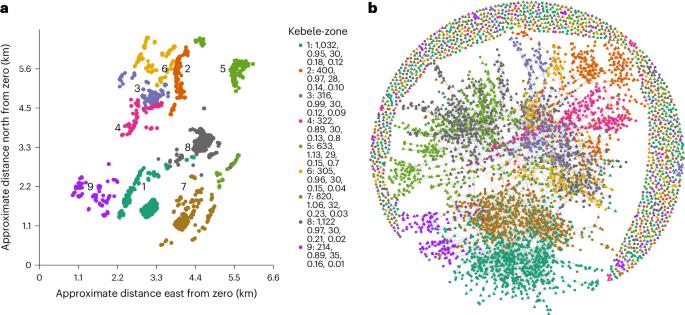埃塞俄比亚中南部偏爱切割女性生殖器官的社会聚集性
IF 15.9
1区 心理学
Q1 MULTIDISCIPLINARY SCIENCES
引用次数: 0
摘要
最近的估计表明,埃塞俄比亚15-19岁的女孩中有一半经历过切割女性生殖器官。确定是否以及如何通过社会传播维持支持fgmc的规范是全球根除工作的一个关键优先事项。在这里,我们提出了第一个大规模的以社会为中心的社会网络研究,估计社会影响和社会选择的偏好切割女性亲属使用来自5163埃塞俄比亚阿尔西奥罗莫成年人的数据。统计模型在横断面数据中解释了网络依赖性,发现了聊天、尊重和借贷网络中的“传染”信号。这表明社会影响有助于FGMC的维持。我们没有发现婚姻咨询网络中社会选择的明确证据,这表明这些网络与FGMC的维持无关。与支持当前根除努力的假设相反,我们发现可以忽略不计的证据表明,FGMC是一种社会协调规范(只有6.3%的人支持)或经验或规范期望。最后,我们提出干预设计建议。本文章由计算机程序翻译,如有差异,请以英文原文为准。


Social clustering of preference for female genital mutilation/cutting in south-central Ethiopia
Recent estimates indicate that half of Ethiopian girls aged 15–19 years have experienced female genital mutilation/cutting (FGMC). Establishing whether and how pro-FGMC norms are maintained through social transmission is a key priority for global eradication efforts. Here we present the first large-scale socio-centric social network study estimating social influence and social selection on preference for cutting female relatives using data from 5,163 Ethiopian Arsi Oromo adults. Statistical modelling, which accounts for network dependence in cross-sectional data, finds signals of ‘contagion’ within chatting, respect and money-borrowing networks. This indicates that social influence contributes to FGMC maintenance. We find no clear evidence of social selection within marriage-advice networks, suggesting these networks are not implicated in FGMC maintenance. Contrary to assumptions underpinning current eradication efforts, we find negligible evidence that FGMC is a social coordination norm (with only 6.3% endorsement) or an empirical or normative expectation. We conclude by making intervention design recommendations. Recent estimates indicate that half of Ethiopian girls aged 15–19 years have experienced female genital mutilation/cutting (FGMC). This socio-centric social network study estimates the social influence and social selection on preference for cutting female relatives using data from 5,163 Ethiopian Arsi Oromo adults. They find no clear evidence of social selection within marriage-advice networks, suggesting that these networks are not implicated in FGMC maintenance.
求助全文
通过发布文献求助,成功后即可免费获取论文全文。
去求助
来源期刊

Nature Human Behaviour
Psychology-Social Psychology
CiteScore
36.80
自引率
1.00%
发文量
227
期刊介绍:
Nature Human Behaviour is a journal that focuses on publishing research of outstanding significance into any aspect of human behavior.The research can cover various areas such as psychological, biological, and social bases of human behavior.It also includes the study of origins, development, and disorders related to human behavior.The primary aim of the journal is to increase the visibility of research in the field and enhance its societal reach and impact.
 求助内容:
求助内容: 应助结果提醒方式:
应助结果提醒方式:


